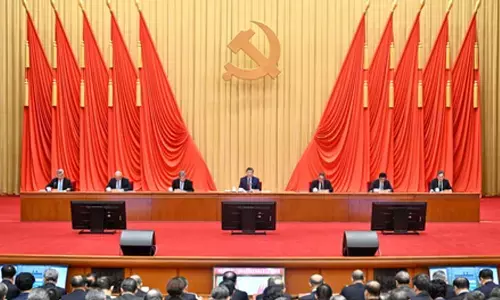Human Resources for the global stage

Let\'s look at some perspective from Vijayaraghavan Pisharody General Manager, Human Resources and Corporate Communication, Stempeutics Research and Smita Ranjan - HR Lead at Value Labs. Employee Engagement: I was recently speaking to a mother of a new-born child and there it reminded me that like parenthood, talent management and leadership will never be a complete science or art.
Let's look at some perspective from Vijayaraghavan Pisharody - General Manager, Human Resources and Corporate Communication, Stempeutics Research and Smita Ranjan - HR Lead at Value Labs. Employee Engagement: I was recently speaking to a mother of a new-born child and there it reminded me that like parenthood, talent management and leadership will never be a complete science or art. It will always fall somewhere in the middle.
There is an unprecedented focus around human resources, talent engagement, leadership, and related best practices in the recent time. Is it time to go back to basics on the very nature of working with people? What is the real motivation behind performing teams?
Several researches have helped parents understand genetic, psychological and behavioural aspects that affect their performance as a parent; and similarly there have been several studies that helped organisations to understand as to what makes people engaged at workplace or off work. In the light of these researches, it will be true to say that the existing so called engagement practices, which are available in plenty in the form of flexi benefits, employee training, or many other well-meaning and overwhelming engagement products, are more like a variety of biscuits that organisations use to move an employee to do something and most of us believe that these are the best initiatives to keep people motivated/engaged.
What we don't see or realise is that these are spectacular variety of products available that can make people jump. The cost of such offerings is astoundingly up to 30 per cent of the payroll cost and some cases even more. Employees are increasingly seeing these offerings as "given" and "new normal". They expect variety and demand more. However are they truly the real engagement initiatives? The answer is in to see what you are trying to address.
A truly engaged employee won't look at too many extrinsic motivators'. (And many of the biscuits' mentioned above are extrinsic in nature.) They dwell for intrinsic motivations. Organisations should start looking at how to brighten those intrinsic motivators to engage individuals, rather than completely focusing on the external factors. External factors are important, but there is no limit to that. However when people find that alignment and motivation internally, that's when true engagement happens.
That's when we see spark of brilliance. Keeping employee morale high Like Steve Jobs once said, "It doesn't make sense to hire smart people and tell them what to do, and we hire them so that they can tell us what to do." There are life lessons that one can learn from a football game. Getting the team to see the overall organisational purpose and the individual role in the game is very critical. Every individual contributes to achieve the organisational goals and hence it is important to showcase and project their individual achievements.
Everyone in the game is not a striker of the ball, everyone can't be Lionel Messi; but everyone in the team has a unique position. Increase team/individual accountability by trusting them for what they can bring to the table and facilitate removing the policy paralysis issues. The biggest morale dampener among smart team/individuals' is by not trusting their capability, looking from behind, double guessing, over supervision etc.
Though every leader will have their favourites' and a "core inner circle", advertising that through the leaders conscious and unconscious behaviour can also be a morale dampener. A leader should be conscious of these softer yet important aspects and removing those before it germinates at every leadership level and coaching other people managers on the same lines can help in keeping the morale of the team high and optimum. On health and well-being of the employees an estimated 350 million people of all ages suffer from depression.
The scary part is that in most cases it is not diagnosed due to several socioeconomic reasons. That's one major area to address when we talk about well-being of the people. Having gone through a professional coaching workshop at CFI, I recognise the importance and relevance of offering trained help for people (employees, family, and society) who need help. This help could be in the form of work or personal. As mentioned in the book titled, 'A little help in living'.
That's what employees today need in the ever changing, complex and networked world. A socially transforming helping lesson to learn is from the "Barefoot doctors experience of China" (a program recognised by WHO for the pioneering effort of barefoot doctors in developing rural primary health in 1968), is that timely help is more valued than specialist help when the need is urgent. The other lesson is that people requirement are not always complex and all we need to have is sufficiently trained people to handle these requirements.
The Mitr programme is a stellar example where the organisation has trained volunteers' in basic counselling techniques so that the employees can benefit when they need them most. Creating an internal pool of trained helpers (internal coach, mentors) will help organisations address this insurmountable issue and bring psychological well-being of the team. Further - a) Removing obstacles and controls, b) Increasing accountability of their own work, c) giving more difficult yet specialised task, d)Leader's confident persona during adversities, can all help in keeping employees motivated most of the time, if not all the time.
Performance: A long term social transformation vis a vis a one-time event. There are two complimentary paths that lead to diverse performance frontiers, one that focuses on meeting organisational expectations and other that exceeds expectations. The current performance management practices are more inclined towards the former than the latter; one that is more of compulsory (I will do what I am told) rather than voluntary; (I will do beyond the expectations) one that focuses largely on resource allocation, monitory incentives, structure and process, extrinsic motivators rather than engagement, deliberation, individuality, and intrinsic motivators.
Current PMS is light years away from addressing the global challenges, dynamics, and realities of individual life. Though it talks about team performance, it's aligned towards individual productivity. While we must appreciate the very nature of doing business and therefore performance measures are a positive reinforcement; what it must shape into is something that will encompass the final outcome over a long term. It must not circumscribe to mere short term economic value.
It should include long term social impact, human happiness, health, environmental impact and spiritual/mental wellbeing. Imagine a case where a sole earning member of a family gets pink slipped, the employee gets into depression, takes extreme step and eventually the family gets ruined and later on his/her children become anti-social. All these in a timeframe, in which you and I are not there to experience, see the cause and effect.
Though it may sound "Shangri-La" but if you imagine and keep human wellbeing, and future generations at the heart of all decisions, the effort or the thought is worth the walk in the thorny garden. As rightly said by Carl Gustav Jung -The creation of something new is not accomplished by the intellect but by the play instinct acting of inner necessity. The creative mind plays with the object it loves. Hence it is very important to keep employees engaged in different ways rather than making them act like machines.
Traditional practices and wisdom never dies; like the mother of the 3 month old baby mentioned; "modern day diapers are convenient for the parent but the child will have to deal with diaper rashes."














